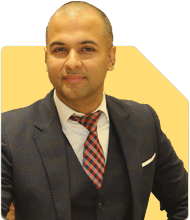Harsh Bharwani |80 Answers |Ask -Follow
Entrepreneurship Expert - Answered on Mar 28, 2023
As CEO and managing director, he leads the international business and employability initiatives at the computer networking institute, Jetking Infotrain Limited.
After graduating from Delhi University, Bharwani joined the family business in 2010 and set up operations in the US and Vietnam.
He has trained over three lakh students in employability, confidence and key life skills.... more

Hello mam I completed my 12th board 2023.and I want to preparation for neet exam 2024 .but my basic concepts (11th and 12th ) are not perfect. How can I improve with preparation please tell me
Review your class notes and textbooks: Go through your class notes and textbooks from 11th and 12th grade to ensure that you have a good grasp of the basic concepts. Focus on understanding the fundamental principles rather than just memorizing facts.
Attend coaching classes: Enroll in a coaching class or find a tutor who can help you revise and strengthen your basic concepts. Coaching classes are designed to provide you with a structured learning environment and personalized guidance.
Take practice tests: Practice tests are an excellent way to test your knowledge and identify areas where you need improvement. Take practice tests regularly to evaluate your progress and adjust your study plan accordingly.
Utilize online resources: There are many free online resources available that can help you revise and practice your basic concepts. Websites like Khan Academy and YouTube channels like Unacademy offer excellent video tutorials and practice exercises.
Join a study group: Joining a study group with like-minded students can help you revise and clarify your concepts. You can share notes, ask questions, and discuss difficult concepts with your peers.
Remember, preparing for the NEET exam requires dedication, hard work, and a well-planned study schedule. By focusing on strengthening your basic concepts and utilizing the resources available to you, you can improve your chances of success. Best of luck with your preparations!
You may like to see similar questions and answers below
Mayank Chandel |2311 Answers |Ask -Follow
IIT-JEE, NEET-UG, SAT, CLAT, CA, CS Exam Expert - Answered on Mar 13, 2023
Mayank Chandel |2311 Answers |Ask -Follow
IIT-JEE, NEET-UG, SAT, CLAT, CA, CS Exam Expert - Answered on Mar 13, 2023
Mayank Chandel |2311 Answers |Ask -Follow
IIT-JEE, NEET-UG, SAT, CLAT, CA, CS Exam Expert - Answered on Mar 31, 2023
Ramalingam Kalirajan |8491 Answers |Ask -Follow
Mutual Funds, Financial Planning Expert - Answered on May 22, 2025
Ramalingam Kalirajan |8491 Answers |Ask -Follow
Mutual Funds, Financial Planning Expert - Answered on May 22, 2025
Ramalingam Kalirajan |8491 Answers |Ask -Follow
Mutual Funds, Financial Planning Expert - Answered on May 22, 2025
Ramalingam Kalirajan |8491 Answers |Ask -Follow
Mutual Funds, Financial Planning Expert - Answered on May 22, 2025
T S Khurana |475 Answers |Ask -Follow
Tax Expert - Answered on May 22, 2025
Ramalingam Kalirajan |8491 Answers |Ask -Follow
Mutual Funds, Financial Planning Expert - Answered on May 22, 2025
Nayagam P P |4726 Answers |Ask -Follow
Career Counsellor - Answered on May 22, 2025
Nayagam P P |4726 Answers |Ask -Follow
Career Counsellor - Answered on May 22, 2025
Nayagam P P |4726 Answers |Ask -Follow
Career Counsellor - Answered on May 22, 2025
Radheshyam Zanwar |1857 Answers |Ask -Follow
MHT-CET, IIT-JEE, NEET-UG Expert - Answered on May 22, 2025






















